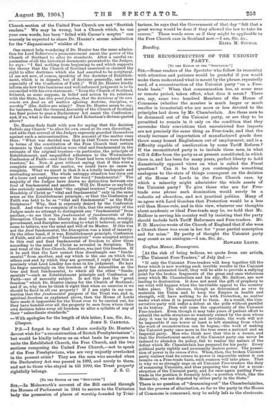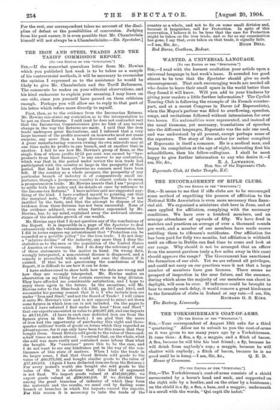THE RECONSTRUCTION OF THE UNIONIST PARTY.
[To THE EDITOR OF THE " SPECTATOR." J SIR,—Some readers of the Spectator who follow its reasoning
with attention and patience would be grateful if you would make them understand what is meant by the phrase, repeatedly used, of a reconstruction of the Unionist party "on a Free- trade basis." When that consummation has, at some near or remote period, taken effect, what does it mean P There are, say, some two hundred Members of the House of Commons (whether the number is much larger or much smaller is immaterial) who are more or less devoted to the principles laid down by Mr. Chamberlain. Are these men to be drummed out of the Unionist party, or are they to be permitted to remain in it only on the condition that they surrender their convictions that unrestricted free imports are not precisely the same thing as Free-trade, and that the steady increase of importation of manufactured goods does throw many honest Englishmen out of employment, and is a difficulty capable of amelioration by some Tariff Reform ?
If the reconstituted party is to include these men, in what will it differ from the party as at present constituted, in which there is, and has been for many years, perfect liberty to hold diametrically opposed views on what is called the Fiscal question ? Can it be that you contemplate something analogous to the state of things consequent on the decision of the House of Lords in the Free Church case, by which a minority might administer the whole assets of
the Unionist party? To give those who are for Free- trade sans phrase such domination would surely be a reductio ad absurdum, and not practical politics. Many of us agree with Lord Goschen that Protection would be a less evil than Home-rule, and in this view, whatever our thoughts
about academic or ideal Free-trade may be, we hold that Mr. Balfour is serving his country well by insisting that the party should include both Tariff Reformers and Free-traders. Mr.
F. D. Maurice wrote of the Church of England that if she were a Church there was room in her for "your partial conception and for mine." By parity of thought the Unionist party may count as an analogue.—I am, Sir, &c., HOWARD LLOYD.
[At the risk of being tedious, we quote from our article, "The Unionist Free-Traders," of July 2nd If only the Unionist Free-traders will keep together till the fever which is now working such terrible results in the Unionist party has exhausted itself, they will be able to provide a rallying point for the broken fragments of the great and once victorious army which Mr. Chamberlain and his ally, Mr. Balfour, are now leading to destruction. It does not need the gift of prophecy to see what will happen when the inevitable appeal to the country takes place. The electors, though as determined as ever to maintain the Union and to keep the Empire in health and strength, will have nothing to do with Protection, no matter under what alias it is presented to them. As a result, the Con- servative party will suffer a defeat at the polls without parallel in its history. Then will come the opportunity of the Unionist Free-traders. Even though it may take years of patient effort to rebuild the noble structure so wantonly ruined by the men whose duty it was to keep it strong and inviolate, the work will not be impossible if one tower at least is left standing from which the work of reconstruction can be begun,—the work of making the Unionist party once more in the true sense a national and an Imperial party. Men who think now that this is a dream, and that the Protectionist section of the Unionist party can never be induced to abandon its policy, fail to realise the nature of the defeat which Mr. Chamberlain has prepared for his party. Every political party rightly and necessarily desires power. The posses- sion of power is its raison d'être. When, then, the broken Unionist party realises that its return to power is impossible unless it can reunite on a Free-trade basis, such reunion will take place. That is why we so strongly urge on all Unionist Free-traders the duty of remaining Unionists, and thus preparing the way for a recon- struction of the Unionist party, and for once again putting Free- trade in the position it formerly held,—a position which, like the Monarchy, was not disputed by either party in the State."
There is no question of "drumming out" the Chamberlainites, but the process of elimination, so far as the party in the House of Commons is concerned, may be safely left to the electorate.
For the rest, our correspondent takes no account of the disci- pline of defeat or the possibilities of conversion. Judging from his past career, it is even possible that Mr. Chamberlain himself will not always be a Chamber]ainite.—En. Spectator.]



































 Previous page
Previous page